- Home
- Marina Oliver
Eugenie and the Earl Page 6
Eugenie and the Earl Read online
Page 6
The Duke nodded and pointed to the desk. 'I kept it in that drawer, which was always locked. But when I come home I discover that it is not locked and the key to it, which was always in my dressing room in what I thought a safe place, has broken off inside the lock. All my papers had been disturbed, they are not how I left them, and the money I kept there is gone. No wonder George decided to visit his aunt.'
*
Chapter 5
Two days later Eugenie and her uncle set off early in the morning by post chaise to her home bear Bath.
'Are you willing to travel all day?' the Duke asked. 'If we change horses frequently we can be there before it grows dark, and I assume there will be servants there. I understand Eugene left a housekeeper and people who would look after the house for him.'
Eugenie nodded. 'He was always hoping Mama would recover and they would be able to come home, but she never did. Besides, the war continued and it was impossible to travel through France. And to come by sea through Italy would have been too expensive and dangerous.'
During the journey she told him more about their life in Switzerland, and her own journey home.
'I wish I knew who Hugues was. He made it possible for me to get to England, and gave me money. I cannot think how he had English guineas available. And I would like to repay him.'
'The fishermen who brought you traded with England, no doubt. They could have had some guineas.'
'I suppose so. I never thought of that.'
They stopped for dinner, and reached Beechcotes an hour before sunset. The journey had been easy, they had no lame or unsuitable horses hitched to the post chaise, and with teams to pull it they drove along swiftly.
The gate to Beechcotes was open, and Eugenie was startled to see that it was hanging on one hinge, and the grass was growing high about the posts. The small gatehouse, where one of the gardeners used to live, looked empty and its garden was overgrown with weeds.
The Duke frowned. 'It does not look as though your bailiff has been doing his job here, as well as not sending you money,' he said.
As they approached the house Eugenie grew more and more angry. The gravel of the drive had not been raked for years. The grass of the parkland surrounding the house was tall and rank, had not been cut, she thought, since they had left the country. The windows, when they came close enough to see them, were dirty, and paint was peeling from the window frames and the front door.
'We may have to find rooms elsewhere for the night,' the Duke said, and Eugenie heard the anger in his voice. He sighed. 'I should have visited, to make sure it was all being kept up properly, but your father said he had complete confidence in his bailiff. Now I wonder where the wretched fellow is?'
Telling the post boys to wait, he climbed down and strode to the front door. There was a bell pull, but he ignored it and hammered on the door with his cane. Eugenie, glancing at the dirt-encrusted windows, saw a face at one of them. She called to her uncle to tell him someone was within, but no one came. He hammered on the door again. After a while he came back to the post chaise.
'Where are the stables, Eugenie?'
'If we go past that end of the house the drive leads to them.'
'Good. You heard?' he asked the boys, and clambered back into the chaise. They took it where Eugenie directed, and came to a big stable yard, the gravel overgrown with weeds, and apparently just two boxes occupied. Two equine heads poked over the lower doors, but there was no human presence.
The Duke climbed down again and Eugenie followed him. 'Deal with the horses,' he ordered. 'There is probably some hay and feed somewhere. Just look for it. I will come back as soon as possible to tell you what we are to do.'
'This way,' Eugenie said. 'The kitchen door may be unlocked. If not, I can probably find a window I could get in through. Several appear to be broken.'
She could barely contain her fury at the condition her home was in. Not only had the bailiff not sent the money which would have made such a difference to her mother's comfort, he seemed to have totally neglected the house. Had he, by doing so, stolen more money for himself?
The kitchen wing looked deserted, but the door from the stable yard that led into the passageway was not locked. Eugenie gave her uncle a triumphant look, opened it, and walked inside.
*
Various rooms led off the passageway, pantries, a scullery, a sitting room for the housekeeper, and a big kitchen. In this they found no evidence of any work being done. The fire was not lit, but there were dirty plates and dishes on the big centre table. Eugenie looked at the shelves which had once contained a huge selection of copper dishes. They were empty. She looked more closely at the plates. They were the ones normally used in the kitchen, and not, as she had feared, from her mother's precious Sevres collection.
She turned to go into the butler's pantry, where there were many cupboards for storing glasses and their ordinary crockery, and drawers for the silver. All had gone.
'Let's go and find that person I saw peering from the window. There must be someone here who can try and explain what has been going on.'
'It seems obvious,' the Duke replied. 'Just let me get my hands on that rascal of a bailiff, and he'll wish he'd never been born.'
'I'll get to him first!'
They went through what seemed an empty house, away from the servants' quarters into the main part of the house. There Eugenie almost cried with fury. In the entrance hall she could see that some of the paintings and furniture had gone. She almost ran across the hall to the room where she had seen the face, and flung open the door, but the room was empty. More of the paintings, furniture and ornaments had gone, including her mother's precious collection of Meissen porcelain. The rest, the chairs and chests which she remembered her mother had ordered to be covered with dust sheets before they left, were bare and neglected.
The Duke put his arm round her. 'We'll try and get back what we can. But the man who did this will spend the rest of his life in prison. Come, shall we try and find the person you saw?'
Eugenie shook her head. 'There are too many staircases and ways to evade a search,' she said. 'We'd need an army to search properly. And they could get out and away without us noticing.'
'Then we'll go back and make sure they don't take those horses,' he said, 'and come back tomorrow better prepared.'
'First,' Eugenie said as they walked back through the kitchens, 'I want to go and see Farmer Robson. He's been Papa's tenant for as long as I can remember. He may know what's been going on. He lives only a mile away, on the road towards the village.'
They collected the post chaise, and as an afterthought Eugenie asked the boys to tie the two horses they had found in the stables to the back of the chaise. They were elegant, thoroughbred beasts, not the local rough ponies she had at first assumed.
'We'll make it difficult for them to escape,' she said.
It took very little time to reach Farmer Robson's house. It was in stark contrast to Beechcotes, well kept, neat, and looking prosperous. Telling the post boys to wait, Eugenie knocked on the door. A tall, large-boned woman opened it and looked at them, frowning.
'Lost the way?' she asked.
'Mrs Robson, don't you recognise me? I know it's been ten years, but they say I'm very like my mother.'
'Your – Miss Eugenie! Now I see it. Well, it's a sight for sore eyes. But your parents? Are they back?' She looked worried. 'Are they with you?'
'No, I came with my uncle, the Duke of Norwich, Papa's brother. May we come in? And where is your husband?'
'I'll send my lad for him, he's not far away. But tell your boys to take the carriage into the yard. There's men there to help.'
Eugenie gave quick instructions, and she and the Duke were ushered into a spotless living room.
'Now, would you like a cup of tea, or something to eat? It's late, but these days my Ed works every hour he can.'
'Tea would be welcome. And do you still make those delicious scones?'
She laughed. 'The ones you always
tried to take before they had cooled from the oven? Yes, I'll bring some.'
'Can I can send one of your boys to the village to book us rooms at the Wheatsheaf,' Eugenie asked. 'It's getting late, and I think we will have to discover the whole story tomorrow. But I will ask Ed to keep the two saddle horses, out of sight!'
'And tomorrow we can set things going,' the Duke added. 'I know a few people we can call on for help, though I am afraid now the wretches know we are here they may escape. But we'll track them down, don't fear.'
*
'Tonks comes 'ere each month ter collect the rent,' Farmer Robson told them a few minutes later. 'We don't see 'ide nor 'air of 'im else.'
'What about the servants? There's no one there now.'
'Tonks sent 'em all away, said yer pa 'ad ordered it. In summer o' the year the war started again, it were. Said as 'ow your pa wrote 'e wouldn't be comin' back. Give 'em good references, an' a quarter's pay.'
'Where did they go?'
'Cook went to 'er sister's at Radstock, said 'er were too old ter begin again. Billy were give a cottage by Rector when 'e were turned out o' gatehouse. Old sexton 'ad just died. The rest went ter Bath or Bristol and two o' the maids went ter Cheltenham.'
'Mr Tonks 'as a new job out on Bristol road,' Farmer Robson's son Freddy said.
'What? How do you know?' Eugenie asked.
Freddy grinned. 'Saw 'im goin' inter this big 'ouse. A few weeks back, Pa, when I were sent ter Bristol wi' some brass fer Aunt Nelly. She's bin ill, see,' he explained to Eugenie.
'Could you take us to this house?' the Duke asked.
'Aye, course I can. Biggest 'ouse in that village.'
'Then may we take him tomorrow morning, Mr Robson? If he comes to the Wheatsheaf at, let me see, nine o'clock? Have you a gig he can drive?'
'Aye.' Farmer Robson looked puzzled. 'You won't use the chaise?'
'I'd rather not let him know who we are until we discover what the situation is. Come, Eugenie, it's time we let these people get to bed, and we need to get to the Wheatsheaf ourselves.'
He waited until they had been shown to a private sitting room, and were sipping wine before he explained.
'I suspect some villainy,' he said. 'I doubt it's a new job Tonks has obtained. But though it's late I must leave you for a while to go and see some good friends of mine.'
'If we find him there, can we take a constable to arrest him?'
'I doubt any local constable would serve. Nor, even if we had time to get one, would one of the Runners. I have friends here who will help.'
With that she had to be content. She was in bed and fast asleep before he returned, but in the morning as they ate breakfast he explained.
'We suspect he's a thief. He may have accomplices, who helped him take away the paintings and so on, and they may be at this house. So I have borrowed half a dozen of the militia. We will ride just behind you, but I want you to come in Farmer Robson's gig with Billy, and once he has shown us the house to stay out of the way until we have it all under control.'
Eugenie had to agree. She would only be in the way otherwise. At least he was permitting her to be present later, when no doubt the bailiff would be questioned.
Soon afterwards the militia arrived, and Billy came with his father's gig. The Duke asked him to lead the way, and they went through Bath and out towards Bristol. About four miles from Bath Billy turned to point towards a substantial house set well back from the road in a small park. Following his instructions Billy drove on, and halted a hundred yards past the house. He and Eugenie watched as the Duke and the Captain of the militia men went up the driveway to the house. Two of them peeled off and went to the back of the house while the Duke hammered on the front door.
A very correctly attired butler came to open it. He stepped back in alarm as the Duke showed him his pistol, and the soldiers strode past them. Eugenie longed to hear what was being said, but the door was closed on the last of the soldiers.
'What's goin' on, Miss Eugenie?' Billy asked, and turned the gig round to face towards the house. 'Can't us get closer?'
She was just as eager as he was to know what was happening behind that frustratingly closed door. Was Tonks there? Did he have accomplices? Did the house belong to him, as they suspected? Had he used the money he had stolen from her father to purchase or hire it?
'We'd better do as my uncle told us,' Eugenie said. 'I'm sure he will summon us when it's safe.'
It was only another ten minutes before the door was opened, and the Duke came onto the front steps and waved to them. Billy let out a cry of glee and set the sturdy cob that had pulled the gig to an unsteady canter. The startled animal almost careered past the entrance to the drive, but Billy hauled on the reins and managed to drag him through the gateway, where he came to a sudden halt that almost upset them.
'Wait here, will you, Billy?' the Duke asked, and Billy, frustrated, sighed and nodded.
'Poor lad,' Eugenie said as her uncle led her into the house. 'He's as curious as I am.'
'Well, perhaps we'll get some answers now. There are half a dozen people we think are just servants, and your Mr Tonks with an hysterical young woman who will, I trust, be able to give us more than he seems willing to offer, once she has understood we do not intend to string her up on a gibbet.'
The servants were huddled in a group in a large dining room. Eugenie glanced round and frowned when she saw several of Beechcotes' paintings on the walls, various ornaments displayed on a sideboard and several pieces of furniture around the room.
'It's all from Beechcotes,' she said quietly to her uncle, though she wanted to scream and howl with fury.
'We'll check the rest of the house later. First, Tonks and his woman must be secured while we question the servants. Then,' he said, his voice cold as ice, 'we will see what they have to say.'
*
Eugenie sat in a corner of the dining room while the Duke talked to the servants. None had been employed by Tonks for more than four years, which was when they understood he had bought the house. None had been employed at Beechcotes, or even knew where it was. Nor had they heard of the Daubney family.
They assumed Mr Tonks had inherited a fortune when he bought the house, and employed them. It was already furnished when they arrived, but they did not know whether he had bought it furnished or brought in his own. Occasionally new items, usually small ornaments, appeared. The wine cellar, the butler said, was already well stocked with a fine collection of wines.
Mrs Tonks, as they named the hysterical woman, had married their master a year ago. He had met her, they said, at Bath at one of the Assemblies there, but they knew nothing of her background and none of her family had ever been to visit. Mr Tonks, but not his wife, went away for three or four days every month, but he did not take his valet or coachman with him and they did not know where he went. He did not, however, take dress clothes with him, the valet added, so he could not have been going to stay with anyone important.
'Very well,' the Duke said. 'For the moment you will all stay in this room, and afterwards you will all stay at the house and as far as possible carry out your normal duties while further investigations are made. If you leave you will receive no references and no more wages, but I am going to take the addresses of your families, so you will not be able to hide with them.'
He turned to Eugenia and they left the room.
'I don't think any of them have been involved in his thieving,' he said. 'Now we will go and question Mrs Tonks. I suspect she will be more forthcoming than he will be.'
When they took her to a small room to question, Mrs Tonks was clearly terrified. She kept protesting, in between bouts of loud weeping, that she had done nothing wrong, she knew nothing of her husband's business affairs, nor any of his family. They had met in Bath, and were married within weeks.
'Where were you married?' the Duke interrupted her to ask. 'Which church?'
'I can't recall! It was some small church in the country. It was a runaway marriage, you se
e,' she added, with a coquettish glance at the Duke. 'My family did not approve because Mr Tonks is not of the aristocracy, and they were planning to have me marry a Duke. But I was of age, just, so we used a special licence.'
Eugenie barely managed to stop laughing. The thought of any Duke being willing to marry this overblown female whose Cockney accent kept breaking through her more refined tones was risible. The Duke himself kept a remarkably straight face.
'There will be records,' he said casually.
Were the wretched pair really married, Eugenie wondered. She looked considerably more than the early twenties she claimed, and at this remark of the Duke's she took refuge in her handkerchief, reiterating that she could not remember, had never known the name of the church nor of the rector who performed the ceremony.
At last they let her go, but only as far as her bedroom, where she was to be locked in until they had finished with Mr Tonks.
'Now, perhaps,' the Duke said when she had been led away, wailing dolorously, 'we may hear some truth.'
*
Mr Tonks, however, resolutely refused to say much other than he had received instructions from his employer to sell what he could and send the money to Switzerland. 'Which I did.'
'And this house?'
'A legacy.'
'The items which came from Beechcotes? Most of the things here.'
'I bought them.'
And that was it. They could get nothing more from him.
'Very well,' the Duke said at last. 'You will be taken to the prison and kept there while we try to discover where the money you say you sent to Switzerland actually went. It didn't arrive.'
'I sent it. I can't be responsible for what happened to it afterwards.'
They went back to Beechcotes in a thoughtful mood.
'Can you bear to go through and house and list what is missing?'
'I may not remember much. I was only ten years old when we left.'

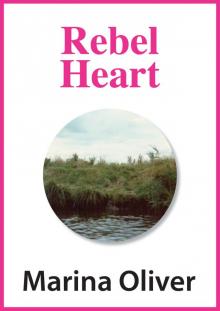 Rebel Heart
Rebel Heart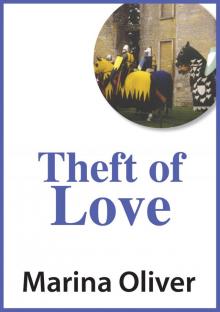 Theft of Love
Theft of Love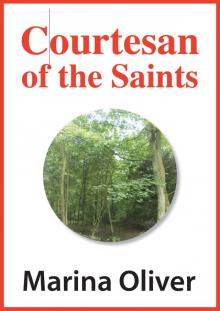 Courtesan of the Saints
Courtesan of the Saints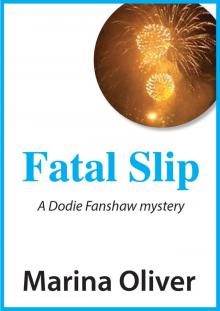 Fatal Slip
Fatal Slip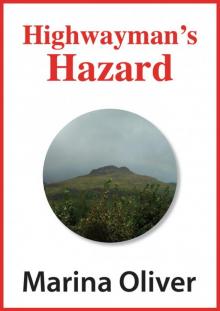 Highwayman's Hazard
Highwayman's Hazard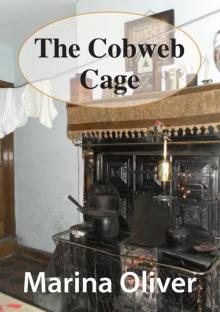 The Cobweb Cage
The Cobweb Cage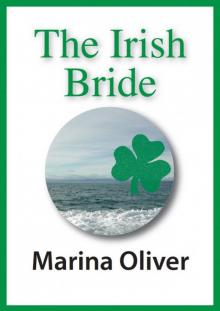 The Irish Bride
The Irish Bride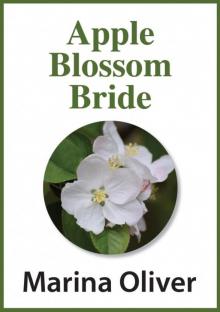 Apple Blossom Bride
Apple Blossom Bride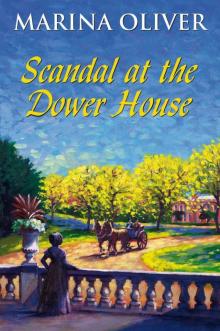 Scandal at the Dower House
Scandal at the Dower House Eugenie and the Earl
Eugenie and the Earl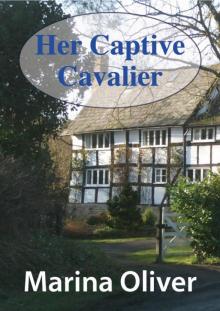 Her Captive Cavalier
Her Captive Cavalier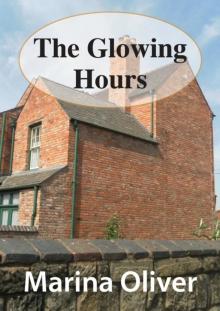 The Glowing Hours
The Glowing Hours Sibylla and the Privateer
Sibylla and the Privateer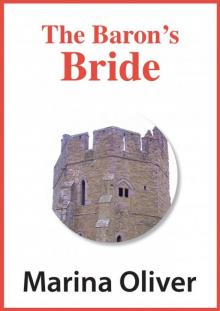 The Baron's Bride
The Baron's Bride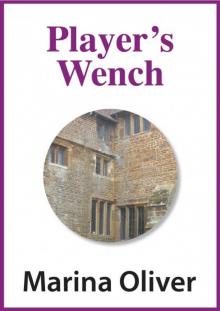 Player's Wench
Player's Wench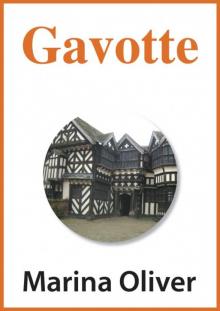 Gavotte
Gavotte The Chaperone Bride
The Chaperone Bride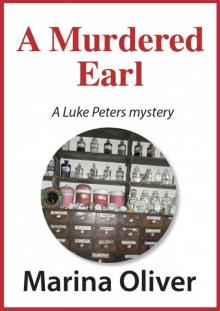 A Murdered Earl
A Murdered Earl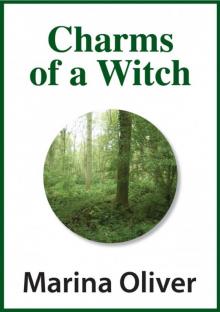 Charms of a Witch
Charms of a Witch Convict Queen
Convict Queen The Accidental Marriage
The Accidental Marriage